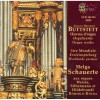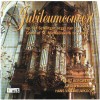Composers
Johann Heinrich Buttstett (Buttstedt, Buttstädt) (April 25, 1666, Bindersleben – December 1, 1727 Erfurt) was a German Baroque organist and composer. Although he was Johann Pachelbel's most important pupil and one of the last major exponents of the south German organ tradition, Buttstett is best remembered for a dispute with Johann Mattheson.
Buttstett was born in Bindersleben (now part of Erfurt) into the family of Johann Henricus Buttstett, a well-educated local pastor who used to study in the University of Erfurt. He began studying music at an early age, becoming a pupil of Johann Pachelbel, then organist of Erfurt's Predigerkirche, in 1678. His professional career began in 1684 in the Reglerkirche and continued in the Kaufmannskirche, where he was working in 1687. In both cases he was not only the church organist but also teaching in church schools. In 1691 Buttstett succeeded Nicolaus Vetter at the Predigerkirche (Pachelbel quit in 1690 and Vetter, who succeeded him, moved to Rudolstadt in 1691); he remained there until his death 36 years later. Buttstett married Martha Lämmerhirt (a distant cousin of JS Bach's mother) in 1687 and had ten children with her.
In 1716 Buttstett published Ut, mi, sol, re, fa, la, tota musica et harmonia aeterna, a work directed against Johann Mattheson's first major treatise. Mattheson was a progressive thinker who embraced the coming of the Classical style and miscellaneous modern principles aimed at widespread music education (limited to teaching 18th century styles of French and Italian secular music), whereas Buttstett sought to defend the musical tradition of the past: from basic practical things like the use of solmization and composing with the Greek modes to the global concepts of music and harmony that were used during the past several centuries.
Buttstett was somewhat acclaimed as a teacher during his years at the Predigerkirche, surrounding himself with a circle of pupils. The most important composer to receive musical training from him was Johann Gottfried Walther.
Recently Added
Biography
Johann Heinrich Buttstett (Buttstedt, Buttstädt) (April 25, 1666, Bindersleben – December 1, 1727 Erfurt) was a German Baroque organist and composer. Although he was Johann Pachelbel's most important pupil and one of the last major exponents of the south German organ tradition, Buttstett is best remembered for a dispute with Johann Mattheson.
Buttstett was born in Bindersleben (now part of Erfurt) into the family of Johann Henricus Buttstett, a well-educated local pastor who used to study in the University of Erfurt. He began studying music at an early age, becoming a pupil of Johann Pachelbel, then organist of Erfurt's Predigerkirche, in 1678. His professional career began in 1684 in the Reglerkirche and continued in the Kaufmannskirche, where he was working in 1687. In both cases he was not only the church organist but also teaching in church schools. In 1691 Buttstett succeeded Nicolaus Vetter at the Predigerkirche (Pachelbel quit in 1690 and Vetter, who succeeded him, moved to Rudolstadt in 1691); he remained there until his death 36 years later. Buttstett married Martha Lämmerhirt (a distant cousin of JS Bach's mother) in 1687 and had ten children with her.
In 1716 Buttstett published Ut, mi, sol, re, fa, la, tota musica et harmonia aeterna, a work directed against Johann Mattheson's first major treatise. Mattheson was a progressive thinker who embraced the coming of the Classical style and miscellaneous modern principles aimed at widespread music education (limited to teaching 18th century styles of French and Italian secular music), whereas Buttstett sought to defend the musical tradition of the past: from basic practical things like the use of solmization and composing with the Greek modes to the global concepts of music and harmony that were used during the past several centuries.
Buttstett was somewhat acclaimed as a teacher during his years at the Predigerkirche, surrounding himself with a circle of pupils. The most important composer to receive musical training from him was Johann Gottfried Walther.




